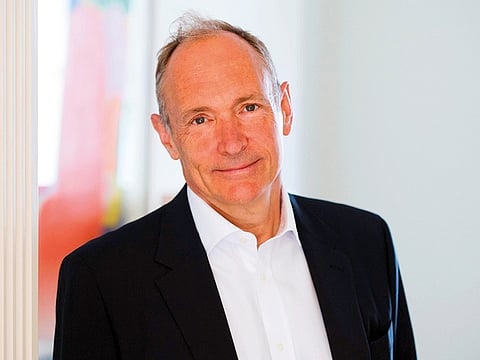World Wide Web inventor calls for new internet, claims old one is broken
US Presidential election and Brexit vote were ‘wake-up call’

Dubai: The inventor of the World Wide Web, Tim Berners-Lee, outlined on Monday his manifesto for a more democratic internet, while attacking social media giants such as Facebook and their mishandling of user data.
In a wide-ranging keynote speech at Gitex Technology Week in Dubai, Berners-Lee criticised the current state of the project he started in 1989.
He called the 2016 US Presidential election, in tandem with the UK’s Brexit referendum, a “wake-up call” in his decision to reinvent the internet, and break what he had once built.
The result, he said, was an open-source project dubbed Solid, a project that the computer scientist said he had been working on for the past two years alongside researchers at the Massachusetts Institute of Technology (MIT).
Built around the notion of users’ controlling how their data is shared, Berners-Lee said that Solid would enable people to choose which apps can access their data, and how.
Referring to the Cambridge Analytica incident, in which the company harvested personal data from millions of Facebook users, as a “scandal” and a “debacle,” he said that the May 2018 revelations were a “tipping point.”
The episode left “people in the streets aware of the issue of their data being misused … as part of manipulating people en masse to voting certain ways, and so on,” Berners-Lee said
This left the inventor, and the people around him, feeling like they had to do something.
But it wasn’t always so bad.
Around the turn of the century, you’d have been forgiven for feeling optimistic about the future of the internet, Berners-Lee said.
“Democracy and science are very powerful because everyone is informed. Things like Wikipedia have … produced a level of truth … Politicians are more accountable,” he said.
That wasn’t to last, however. “Well, look at where we’ve got to now,” Berners-Lee remarked. “People talk to me about fake news, they worry about clickbait … Privacy is a huge issue.”
The engineer, who was named as one of the most important people of the 20th Century by Time Magazine, also pointed to the monopolisation of social media as another cause for concern.
The likes of Facebook, he said, were responsible for a decline in people’s enjoyment of the internet.
Instead of discovering the vast trove of information and content the web contains, people were simply “sitting in an environment controlled by one company.”
This consolidation was leading to a drop off in innovation and exciting new developments online, Berners-Lee said, and many smaller inventors were “just waiting to be stomped on by a very large company.”
Overall, he said, people were not happy with the state of the internet, driving his decision to overhaul the web and start again.
Inrupt, also started by Berners-Lee, is the commercial structure behind the Solid project, and is intended to push adoption of the new network to as many developers and businesses as possible, eventually making it viable for the general public to start using.
“I’m incredibly optimistic for this next era of the web,” Berners-Lee said about the project in a blog post earlier this month. “The future is still so much bigger than the past.”



